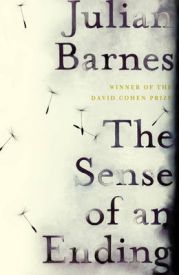The Sense of an Ending
A classic Julian Barnes work. What more is there to say. This one’s very short, but intense, enjoyable, eminently quotable, engrossing. Typical Barnes (in a good way), though perhaps with less wordplay than usual.
As a Barnes fan, I’d be tempted to give this five stars, but unfortunately I found the last quarter of the novel to be lacking; the ending wasn’t quite as tight and ultimately unfulfilling. But still, recommended overall.
Some quotes:
History is that certainty produced at the point where the imperfections of memory meet the inadequacies of documentation.
He had a better mind and a more rigorous temperament than me; he thought logically, and then acted on the conclusion of logical thought. Whereas most of us, I suspect, do the opposite: we make an instinctive decision, then build up an infrastructure of reasoning to justify it. And call the result common sense.
History isn’t the lies of the victors, as I once glibly assured Old Joe Hunt; I know that now. It’s more the memories of the survivors, most of whom are neither victorious nor defeated.
…then you begin to understand that the reward of merit is not life’s business.
It strikes me that this may be one of the differences between youth and age: when we are young, we invent different futures for ourselves; when we are old, we invent different pasts for others.
…why should we expect age to mellow us? If it isn’t life’s business to reward merit, why should it be life’s business to give us warm, comfortable feelings towards its end? What possible evolutionary purpose could nostalgia serve?
But time… how time first grounds us and then confounds us. We thought we were being mature when we were only being safe. We imagined we were being responsible but were only being cowardly. What we called realism turned out to be a way of avoiding things rather than facing them. Time… give us enough time and our best-supported decisions will seem wobbly, our certainties whimsical.
I began to feel a more general remorse – a feeling somewhere between self-pity and self-hatred – about my whole life. All of it. I had lost the friends of my youth. I had lost the love of my wife. I had abandoned the ambitions I had entertained. I had wanted life not to bother me too much, and had succeeded – and how pitiful that was.
Sometimes I think the purpose of life is to reconcile us to its eventual loss by wearing us down, by proving, however long it takes, that life isn’t all it’s cracked up to be.
All book cover images are from Goodreads unless specified otherwise.
